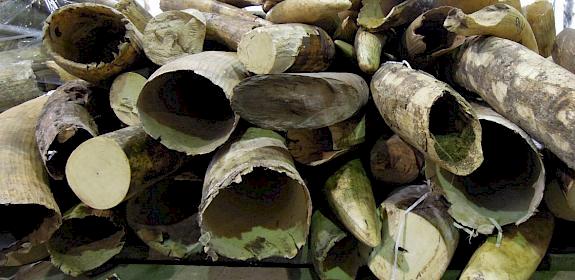Scene-of-crime evidence gathering: TRAFFIC helps deliver training in Tanzania and Kenya
Dar es Salaam, United Republic of Tanzania, 2017—Inadequate investigative capacity for wildlife crimes has proved to be a major drawback in the fight against poaching and illegal wildlife trade.
In Kenya and Tanzania, a significant proportion of elephant poaching and ivory trafficking cases either lead to lenient sentences, or are withdrawn or dismissed altogether due to a lack of - or exceedingly weak - evidence . This eventually leads to a system of justice that fails to adequately deter wildlife crimes, and to provide necessary disincentives for offenders.
In order to tackle this issue, earlier this year instructors from the College of African Wildlife Management, Tanzania, and the Kenya Wildlife Service (KWS), Field Training School of Manyani, learned the best ways to secure and gather evidence at poaching scenes-of-crime.
The “training for trainers” format included practical and theoretical tuition on forensic science; crime scene investigation; incident site procedures; evidence collection and transfer; and wildlife forensic applications.
Held in collaboration with TRACE Wildlife Forensics Network and the Netherlands Forensic Institute, the workshop was in direct response to a report prepared by the Tanzania Elephant Protection Society (TEPS) Task Force to Tanzania’s Parliamentary Committee on Natural Resources, which identified the need for specialist input to address perceived gaps in national training programmes.
Through the financial support of WWF-US, the training course was developed in consultation with KWS, College of African Wildlife Management, TRAFFIC and WWF to institutionalize modules on Wildlife Crime Scene Management and Forensics into the curricula of wildlife training academies in Kenya and Tanzania.
“Thorough evidence gathering, alongside robust legislative and judicial processes, are prerequisites to ensure those carrying out wildlife crime don’t get away with it
William Crosmary, Programme Manager from TRAFFIC’s East Africa Office.
Currently a high proportion of prosecuted cases in Tanzania and Kenya are withdrawn or dismissed due to a lack of or improperly collected evidence.
“Adequate numbers of trained crime scene personnel who know how to gather evidence fully admissible in court will hugely deter wildlife criminals, many of whom currently act with apparent impunity,” said Crosmary.
Although not the first time wildlife crime scene trainings have been carried out in Tanzania and Kenya, such events have been sporadic in nature. TRAFFIC and WWF are working closely with relevant Kenyan and Tanzanian wildlife agencies to institutionalize appropriate techniques into normal working practices as part of their shared overall goal to combat wildlife crime and trafficking in the region.
“The ultimate objective is to come up with training packages customized for various cadres of KWS Law Enforcement officers: as an organization, we appreciate the efforts of TRAFFIC towards this initiative and look forward to working together to build capacity for our personnel,” said Manyani KWS Law Enforcement Academy Commandant Dickson Lesimirdana.
“The plan is to collaborate further with TRAFFIC and other partners to provide detailed training to our trainers to enable them to run such training for our students and other professionals in the conservation sector,” Dr. Alex W. Kisingo, Head of Research and Consultancy Department & Senior Lecturer at the College of African Wildlife Management, Mweka.





